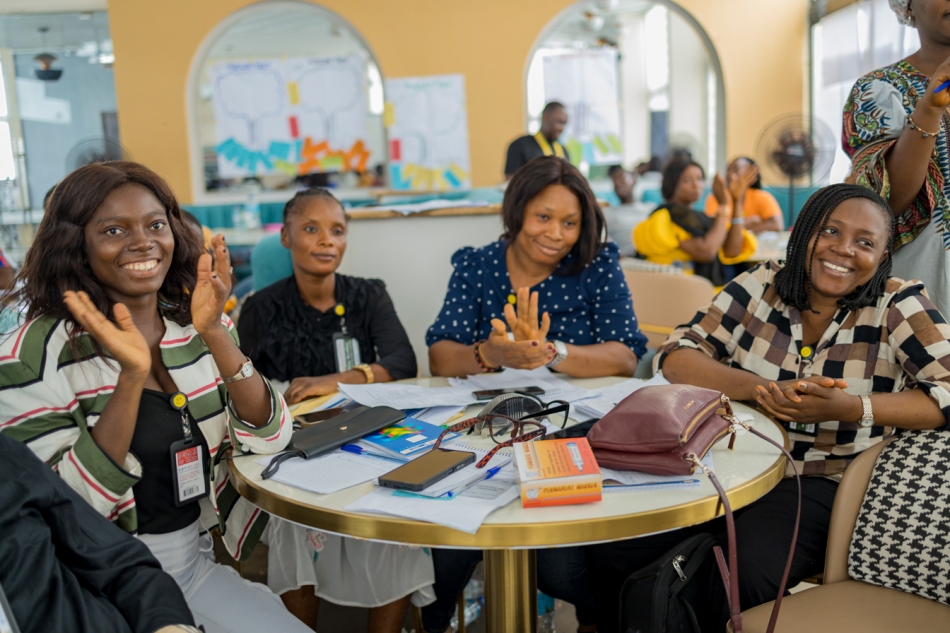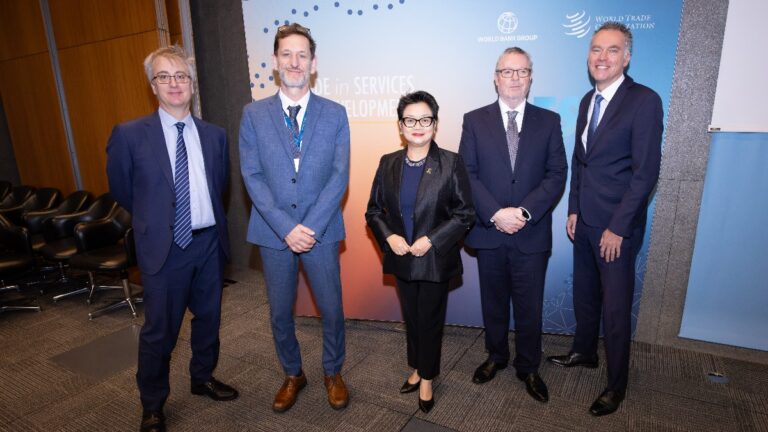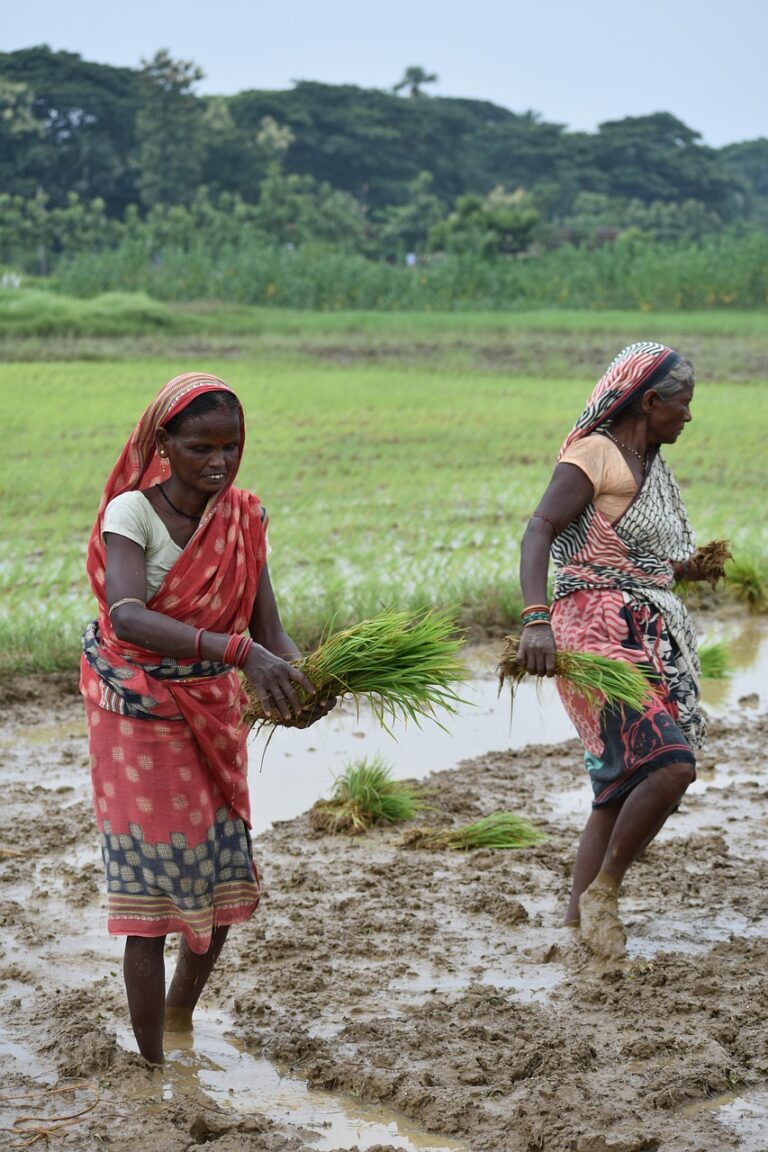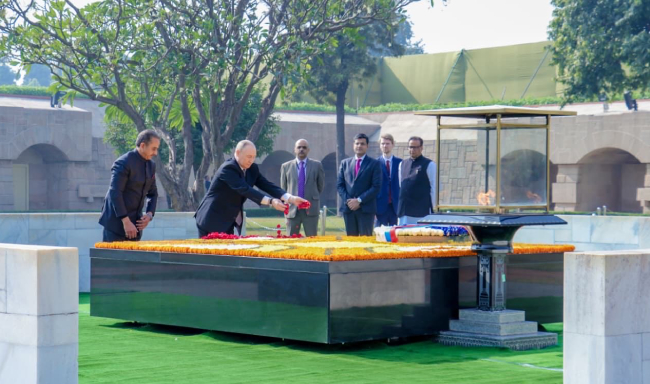
Once equipped with the necessary skills and knowledge, Fatmata and Foday were ready to train other rural women in the district of Kambia. Similar trainings were held in eight other districts of Sierra Leone and benefitted nearly 300 women in total. ©FAO/ Aurelia Rusek
Two-thirds of families in Sierra Leone rely on subsistence farming and petty trading as sources of food and income but rural women rarely have another source of income on which to rely.
Fatmata Binta Jalloh grew up in Makeni, the largest city in the northern province of Sierra Leone. Her mom was a nurse who used to go to rural villages to treat women.
“She often told me about women who were victims of gender-based violence but who depended on their husbands to feed themselves and their children,” she recalls, adding “Sadly, this is still happening today.”
“Most of the issues affecting women are because they are not financially independent; so they have to rely on abusive husbands or family members,” explains Fatmata. “They [rural women] deserve equal opportunities, but society makes it very difficult.”

Today, through her work as a gender and youth expert in Sierra Leone’s Ministry of Agriculture and Food Security, she helps rural women access technical training, inputs or other opportunities to make the most of their agricultural activities.
In another remote village, Foday Kamara grew up in a subsistence farming family. They often lacked adequate food for all family members. This led his parents to send him at the age of 10 to live with his aunt. Today he is the director of a local NGO that supports youth and women’s empowerment.
Fatmata and Foday’s commitment to championing rural women in Sierra Leone led them to participate in a project of the Food and Agriculture Organization of the United Nations (FAO) implemented in collaboration with the NGO Solidaridad West Africa. The project equips women and men with the skills and knowledge to thrive in the agricultural sector through responsible investments in agriculture. It also strengthens the position of rural women to be able to participate in decision-making processes.
“Being able to invest in their agricultural activities represents a qualitative leap forward that would enable rural women in particular to shift from subsistence farming to agribusiness, expanding their economic opportunities,” continues Maud Oustry, FAO Capacity Development Expert.
However, despite significant efforts to level the field for women in recent years, gender inequality is still prevalent in Sierra Leone. While rural women in the country represent 70 per cent of the agricultural workforce, they face significant barriers to access basic resources such as land, training or services.
“Most rural women farmers are illiterate. They don’t have business skills, and they can rarely access finance. Even if they do, perceptions and societal norms are a hurdle,” explains Fatmata.
“If women had the same access to productive resources, services and decision-making processes as men, they would be able to invest in agriculture, develop their agricultural activities and become agri-entrepreneurs with their own businesses,” explains Oustry.
In November 2022, FAO and Solidaridad launched a capacity development programme for rural women as part of the project in Sierra Leone. It aims to enable women to access decent employment in agriculture and to make responsible investments in agriculture as entrepreneurs.
The first step is building the skills of rural women and promoting their participation in decision-making processes.
“Women do about 70 per cent of the agricultural work but when it comes to decision-making, it’s the men. They decide about everything: production, selling, use of resources,” explains Foday.
Raising awareness of women’s rights
Fatmata and Foday, along with 25 other representatives of rural women’s organizations, participated in a ‘Training of Trainers’.
“The material was oriented to help them [rural women] analyze their situation, identify the challenges that prevent them from investing in agriculture and outline potential solutions to address them,” explains Foday.
In order to ensure women are informed about their rights, the participants also studied regulatory frameworks, including recently enacted legislation that addresses issues such as women’s access to finance, employment opportunities, equal pay, maternity leave and protection of customary land rights.
“These are rights for which women have been battling for decades. Knowing about them has given rural women confidence and a sense that things are changing,” tells Fatmata.
Towards inclusive decision-making
Dialogue sessions were also held where women could present their challenges and recommendations to local authorities and discuss a way forward.
“The dialogue sessions were very powerful,” relates Foday. “For instance, women were telling the ordeals they go through to access land despite the new law granting them customary land rights. Many local decision-makers were unaware of the legislation since its popularization is still underway.”
As a result of the dialogue with the paramount chief of Kambia, he committed to coordinate with other village chiefs to ensure that women’s rights are respected.
Women were also invited to attend the district council’s monthly meetings to follow up on other commitments made during the dialogue session. “This is very important because it means women will now be involved in decision-making at local and district level,” explained Fatmata.
During the training events, participants learned that a responsible investment in agriculture benefits not only the investors but also the communities, including women, men and the environment. It contributes to sustainable development, enhances food security and nutrition and respects human rights.
“This was an eye-opener for many people because in every community we have had experiences of companies polluting the land and waters. Now we know that we not only need to ask for a fee for land use but also ensure that their investments are sustainable, environmentally, economically and socially,” explains Fatmata.
By the end of 2024, the programme will have worked with 420 rural women and 210 local male leaders on the importance of women’s participation in decision-making processes. As a next step, FAO and Solidaridad are following up on the commitments made to improve rural women’s participation in responsible agricultural investments.
Source: the FAO News and Media office, Rome
– global bihari bureau





